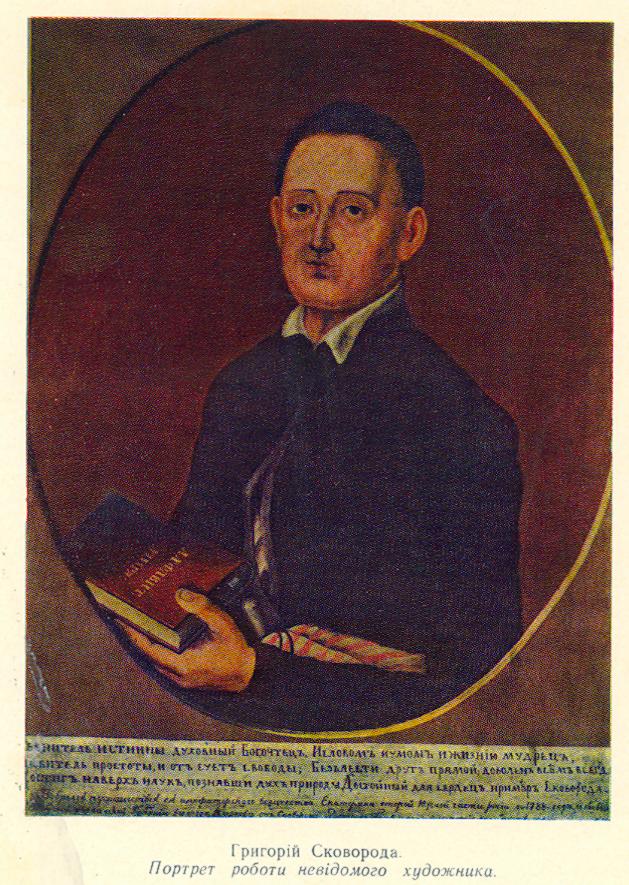- Hryhorii Skovoroda
Infobox Writer
name = Hryhori Skovoroda

imagesize = 200px
caption = Hryhori Skovoroda
pseudonym =
birthdate = 1722
birthplace = Village of Chornukhy
deathdate = 1794
deathplace = Village of Iwanivka
occupation = Writer, Composer, Teacher
nationality = Ukrainian
languages of writing = Latin, Ukrainian
period =
genre =
subject =
movement =
spouse =
partner =
children =
relatives =
influences =
influenced =
website =Hryhorii Skovoroda ( _uk. Григорій Савич Сковорода "Hryhoriy Savych Skovoroda" ) (1722 - 1794) was a Ukrainian
poet ,philosopher andcomposer .Skovoroda received his education at the "Kyiv-Mohyla Academy". Haunted by worldly and spiritual powers, the philosopher led a life of an itinerant thinker-beggar. In his tracts and dialogs, biblical problems overlap with those examined earlier by
Plato and the Stoics.Life
Skovoroda was born into a poor Ukrainian
Cossack family in the village of Chornukhy in the Lubny regiment (Poltavs'ka oblast' ) of the nominal Hetman State ("Malorossiia"), that at the time belonged to the Russian Empire, in 1722. He studied at theKyiv-Mohyla Academy (1734-1741, 1744-1745, 1751-1753) but did not complete the full program. From 1741 to 1744 he was a member of the imperial choir in the 2 capitals of theRussian Empire , Moscow and St.Petersburg. He spent the period from 1745 to 1750 inHungary and may have traveled elsewhere inEurope as well. In 1750-1751 he taught poetics in Pereyaslav. For most of the period from 1753 to 1759 Skovoroda was a tutor in the family of a landowner in Kovrai. From 1759 to 1769, with interruptions, he taught such subjects aspoetry ,syntax , Greek, andethics at theKharkiv College. After an attack on his course on ethics, he in 1769 decided to abandon teaching.Skovoroda also was active as a composer of liturgical music, as well as songs to his own texts. Of the latter, several have been valued sufficiently to pass into the realm of folk music. He was described to be a proficient player on
torban andkobza .In the final quarter of his life he traveled by foot through Ukraine staying with various friends, both rich and poor, preferring not to remain in one place for too long.
Death
Three days before he died, he went to the house of one of his closest friends and told him he had come to stay permanently. Every day he left the house early with a shovel, and it turned out that he spent three days digging his own grave. On the third day, he ate dinner, stood up and said, "my time has come." He went into the next room, lay down, and died. He requested the following epitaph to be placed on his tombstone:
Heritage
This last period was the time of his great philosophic works. In this period as well, but particularly earlier, he wrote poetry and letters in Ukrainian language, Greek and
Latin and did a few translations from Latin.On September 15, 2006, his portrait was placed on the largest banknote in circulation in Ukraine, the 500-hryvnia note worth approximately $100 US.
Hryhoriy Skovoroda Institute of Philosophy , founded in 1946, operates under the auspicies of theNational Academy of Science of Ukraine . [uk icon "About the Institute." "Hryhoriy Skovoroda Institute of Philosophy at NASU." [http://www.filosof.com.ua/about.htm URL accessed 19 October 2006] ]Bibliography
* Skovoroda, Gregory S. "Fables and Aphorisms". Translation, biography, and analysis by Dan B. Chopyk (New York: Peter Lang, 1990) Review: Wolodymyr T. Zyla, "Ukrainian Quarterly", 50 (1994): 303-304.
* Skovoroda, Hryhorii. "Piznay v sobi ludynu". Translated by M. Kashuba with an introduction by Vasyl' Voitovych (L'viv: S$vit, 1995) Selected works (original: Ukrainian language).
* Skovoroda, Hryhorii. "Tvory: V dvokh tomakh", foreword by O. Myshanych, chief editor Omelian Pritsak (Kiev: Oberehy, 1994) (original: Ukrainian language).
* Skovoroda, Hryhorii (Gregory), [http://ditext.com/skovoroda/five.html "A Conversation Among Five Travelers Concerning Life's True Happiness"] (original: Russian language).
* Skovoroda, Hryhorii (Gregory), "Conversation about the ancient world". (original: Russian language).References
Further reading
* Zakydalsky, Taras, [http://ditext.com/zakydalsky/skovoroda.html "The Theory of Man in the Philosophy of Skovoroda" (1965)]
* Pylypiuk, Natalia. ‘The Primary Door: at the threshold of Skovoroda’s theology and poetics’, "Harvard Ukrainian Studies", 14(3-4), 1990, pp551-583
* Marshall, Richard H. Jr., and Bird, Thomas E. (eds.) "Hryhorij Skovoroda: an anthology of critical articles" (Edmonton: Canadian Institute of Ukrainian Studies, 1994)
* Naydan, Michael M. (ed.) ‘Special issue on Hryhorii Skovoroda’, "Journal of Ukrainian Studies", 22(1-2), 1997
* [http://www.wumag.kiev.ua/index2.php?param=pgs20032/78 "The world tried to catch him but failed — Hryhoriy Skovoroda, the 18th-century Ukrainian philosopher"] , "Welcome to Ukraine", 2003, 1
Wikimedia Foundation. 2010.
